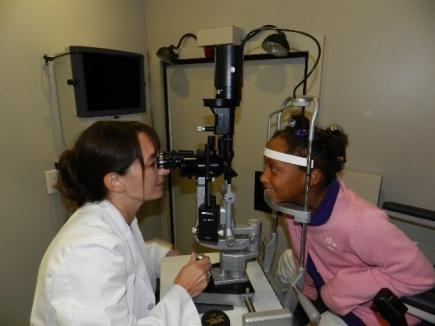
Nadine Forché, OD, MS, FAAO of Five Points Eye Care Center in Athens, Georgia is more than a little familiar with academic excellence. With an undergraduate degree in neurobiology from the University of Pennsylvania, both a Doctor of Optometry and MS in Physiologic Optics from The Ohio State University (earned simultaneously while graduating as class valedictorian), an ocular disease residency and a lengthy list of other academic, professional and community honors, she has earned her place as a thought leader in the profession of optometry. And yet it is her personal connection with patients, individually tailored conversations and personal experiences as a mom that she feels often contribute to her success with one-day contact lenses in day-to-day practice, particularly when fitting children.
With more than half of her contact lens wearers currently in daily disposable contact lenses, Dr. Forché believes that it’s important to present daily disposables and their advantages to every patient. “I present 1-days as the healthiest way to wear contact lenses;” says Dr. Forché, “a brand new pair every day with no need to clean them. I am a part-time 1-day multifocal wearer so I also speak about my own experiences with 1-day lenses.”
With daily disposable lenses gaining in popularity with both children and new contact lens fits in general, we asked Dr. Forché how she approaches that conversation with parents. She emphasizes that there is no ‘one size fits all’ method for discussing contact lenses with parents. “My conversations about contact lenses for children have been varied, depending on the personalities of the parent and child,” she explains. When asked who starts that conversation in her practice, she reports that it takes place with her in the exam room. “Sometimes the parent brings it up, sometimes the child initiates the conversation and if neither do, I always ask if there is any interest in contact lenses,” says Dr. Forché. “If the parent brings it up, it is very important to determine if the child is motivated to wear them or if it is something the parent is pushing. If the child is interested, then the parent must be involved and a discussion about the child’s hygiene and potential ability to wear contact lenses follows. I use my own experiences as a mom to guide the conversation about contact lens wear in children since I have a daughter who wears them.”
When asked what features parents tend to value most in contact lenses for their children, Dr. Forché notes that their values are often the same as her own values as a parent: “As a parent myself, I think health, ease of use and comfort/vision for my child are most important. From a hygiene perspective, 1-day lenses are by far the best and most convenient. Parents want their children to be successful with contact lenses and taking out the disinfection step makes it easier for the child and parent (no nagging about cleaning, buying solutions and making sure they replace their multiuse lenses when they are supposed to). Parents also really like to know they will get a large supply of lenses so that if one rips or gets lost they have an ample supply and won’t run out.”

When asked what the greatest challenge she encounters in fitting daily disposables lenses – and particularly selling annual supplies - Dr. Forché responded similarly to many practitioners. “Of course, it is cost,” says Dr. Forché. She feels that when it comes to responding to this concern, a well-trained staff armed with the proper conversation tools makes all the difference. “We have our staff go over costs with a comparison sheet that has the cost of solutions factored in as well as any rebates for 1-day lenses,” she explains. “Breaking the cost down on a per day basis (it’s less than your daily latte coffee drink!) can also help put the cost in perspective.”
Dr. Forché feels that 1-day lenses play a critical role in the success and growth of her practice. “I believe the availability of 1-day lenses for almost any vision correction need (from simple myopia to astigmatism and presbyopia) has enabled my practice to grow because I am able to offer more comfort and convenience to my patients without compromising their vision,” she says. “For patients with special needs like those suffering from chronic allergies, giant papillary conjunctivitis or sensitivities to preservatives, I personally feel that 1-day lenses are often the only option if they want to remain successful contact lens wearers.”
Dr. Forché also took a moment to share some pearls and tips for daily disposable success in practice. “Don’t assume what patients will pay or what their definition of expensive is. Present the best option for them first, then customize your conversation and options based on their needs and responses. Don’t forget to offer 1-day lenses as a part-time option. I have patients who only use them during allergy season and go back to their multiuse lenses for the remainder of the year. Many times, these patients convert to solely wearing 1-days when they get used to the convenience and comfort.”
Read more about the health, value and depth that CooperVision offers in 1-Day contact lenses with the clariti and MyDay lens portfolios.





